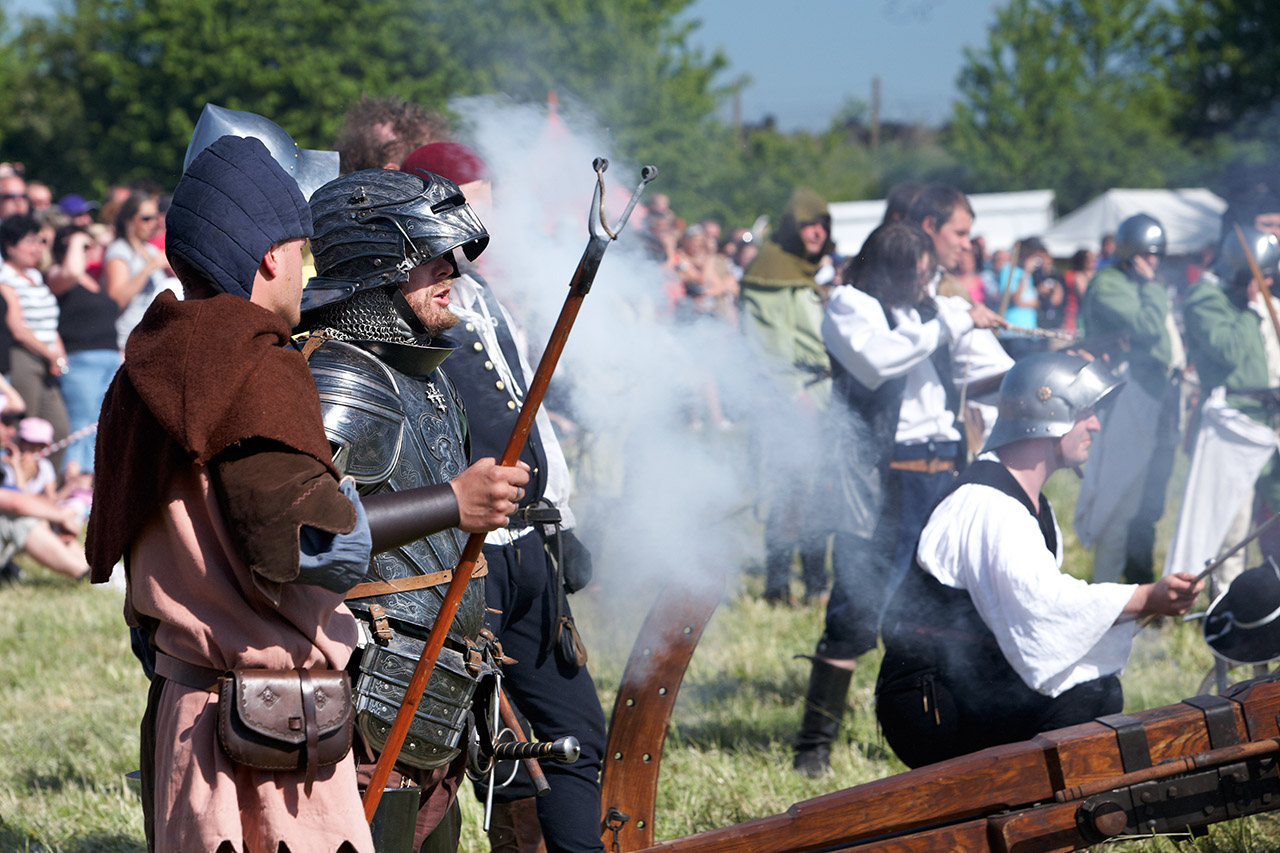Tudors at Kolín

I did not really plan to go to the Kolín Battle, but my previously planned programme was cancelled and I simply refused to stay at home
The seventeenth Kolín Battle didn’t in fact have anything to do with Kolín. Its title “Blood of the Tudors” placed it more than one thousand kilometres westwards, starting with the Battle of Bosworth and ending with the siege of Bologna.
William Shakespeare took the place of the narrator, who told Elizabeth I of her family’s history. That was not a bad solution, even if we take the historical inaccuracies into account. However, a little faux pas occurred in Shakespeare’s story, caused by Anne Boleyn’s preparation for the execution, which took up much larger portion of time than the playback expected and therefore, the spectators heard the falling axe three times and were even informed of Henry VIII’s death, due to the manual corrections of the playback.
There were two stage sets at the clearing where everything took place. The first of these played the role of Elizabeth’s throne room, where Shakespeare told the tale of her ancestors. The described events came to reality by the second set. However, there was a catch; the stage sets were so far that the main figures of the story were about as big as a thumb nail from the spectators’ point of view and one simply couldn’t see that many details.
The soldiers had a chance to enjoy two battles – the Battle of Bosworth, where Henry Tudor defeated Richard III (though the Black Adder chronicles tell that a bit differently) and then a battle during the siege of Bologna. These were interceded by something like a dance performance from the court of Henry VIII, and also by a great lot of waiting for God knows what.
Despite the oppressively hot weather, the photos from the Kolín Battle came out quite good. The shooting was made a bit more difficult by two stages at the spectators’ side of the battlefield, which obstructed the view, and also by the clearing’s size. For the first time I was forced to admit that 200mm lens might not be enough for battles.


![Bitva Kolín [rekonstrukce] / [reanactment]](https://www.karelkremel.com/wp-content/uploads/2012kolin/reenactment_bitvakolin_6782-700x466.jpg)
![Bitva Kolín [rekonstrukce] / [reanactment]](https://www.karelkremel.com/wp-content/uploads/2012kolin/reenactment_bitvakolin_6808-466x700.jpg)
![Bitva Kolín [rekonstrukce] / [reanactment]](https://www.karelkremel.com/wp-content/uploads/2012kolin/reenactment_bitvakolin_6810-466x700.jpg)
![Bitva Kolín [rekonstrukce] / [reanactment]](https://www.karelkremel.com/wp-content/uploads/2012kolin/reenactment_bitvakolin_6812-466x700.jpg)
![Bitva Kolín [rekonstrukce] / [reanactment]](https://www.karelkremel.com/wp-content/uploads/2012kolin/reenactment_bitvakolin_6826-466x700.jpg)
![Bitva Kolín [rekonstrukce] / [reanactment]](https://www.karelkremel.com/wp-content/uploads/2012kolin/reenactment_bitvakolin_6828-466x700.jpg)
![Bitva Kolín [rekonstrukce] / [reanactment]](https://www.karelkremel.com/wp-content/uploads/2012kolin/reenactment_bitvakolin_6837-700x466.jpg)
![Bitva Kolín [rekonstrukce] / [reanactment]](https://www.karelkremel.com/wp-content/uploads/2012kolin/reenactment_bitvakolin_6844-700x466.jpg)
![Bitva Kolín [rekonstrukce] / [reanactment]](https://www.karelkremel.com/wp-content/uploads/2012kolin/reenactment_bitvakolin_6865-700x466.jpg)
![Bitva Kolín [rekonstrukce] / [reanactment]](https://www.karelkremel.com/wp-content/uploads/2012kolin/reenactment_bitvakolin_6880-700x466.jpg)
![Bitva Kolín [rekonstrukce] / [reanactment]](https://www.karelkremel.com/wp-content/uploads/2012kolin/reenactment_bitvakolin_6889-700x466.jpg)
![Bitva Kolín [rekonstrukce] / [reanactment]](https://www.karelkremel.com/wp-content/uploads/2012kolin/reenactment_bitvakolin_6891-700x466.jpg)
![Bitva Kolín [rekonstrukce] / [reanactment]](https://www.karelkremel.com/wp-content/uploads/2012kolin/reenactment_bitvakolin_6912-700x466.jpg)
![Bitva Kolín [rekonstrukce] / [reanactment]](https://www.karelkremel.com/wp-content/uploads/2012kolin/reenactment_bitvakolin_6916-700x466.jpg)
![Bitva Kolín [rekonstrukce] / [reanactment]](https://www.karelkremel.com/wp-content/uploads/2012kolin/reenactment_bitvakolin_6920-466x700.jpg)
![Bitva Kolín [rekonstrukce] / [reanactment]](https://www.karelkremel.com/wp-content/uploads/2012kolin/reenactment_bitvakolin_6928-700x466.jpg)
![Bitva Kolín [rekonstrukce] / [reanactment]](https://www.karelkremel.com/wp-content/uploads/2012kolin/reenactment_bitvakolin_6935-700x466.jpg)
![Bitva Kolín [rekonstrukce] / [reanactment]](https://www.karelkremel.com/wp-content/uploads/2012kolin/reenactment_bitvakolin_6958-700x466.jpg)
![Bitva Kolín [rekonstrukce] / [reanactment]](https://www.karelkremel.com/wp-content/uploads/2012kolin/reenactment_bitvakolin_6960-700x466.jpg)
![Bitva Kolín [rekonstrukce] / [reanactment]](https://www.karelkremel.com/wp-content/uploads/2012kolin/reenactment_bitvakolin_6972-700x466.jpg)
![Bitva Kolín [rekonstrukce] / [reanactment]](https://www.karelkremel.com/wp-content/uploads/2012kolin/reenactment_bitvakolin_6980-700x466.jpg)
![Bitva Kolín [rekonstrukce] / [reanactment]](https://www.karelkremel.com/wp-content/uploads/2012kolin/reenactment_bitvakolin_7002-700x466.jpg)
![Bitva Kolín [rekonstrukce] / [reanactment]](https://www.karelkremel.com/wp-content/uploads/2012kolin/reenactment_bitvakolin_7008-700x466.jpg)
![Bitva Kolín [rekonstrukce] / [reanactment]](https://www.karelkremel.com/wp-content/uploads/2012kolin/reenactment_bitvakolin_7017-700x466.jpg)
![Bitva Kolín [rekonstrukce] / [reanactment]](https://www.karelkremel.com/wp-content/uploads/2012kolin/reenactment_bitvakolin_7024-466x700.jpg)
![Bitva Kolín [rekonstrukce] / [reanactment]](https://www.karelkremel.com/wp-content/uploads/2012kolin/reenactment_bitvakolin_7037-700x466.jpg)
![Bitva Kolín [rekonstrukce] / [reanactment]](https://www.karelkremel.com/wp-content/uploads/2012kolin/reenactment_bitvakolin_7044-700x466.jpg)
![Bitva Kolín [rekonstrukce] / [reanactment]](https://www.karelkremel.com/wp-content/uploads/2012kolin/reenactment_bitvakolin_7060-700x466.jpg)
![Bitva Kolín [rekonstrukce] / [reanactment]](https://www.karelkremel.com/wp-content/uploads/2012kolin/reenactment_bitvakolin_7066-700x466.jpg)
![Bitva Kolín [rekonstrukce] / [reanactment]](https://www.karelkremel.com/wp-content/uploads/2012kolin/reenactment_bitvakolin_7070-700x466.jpg)
![Bitva Kolín [rekonstrukce] / [reanactment]](https://www.karelkremel.com/wp-content/uploads/2012kolin/reenactment_bitvakolin_7075-700x466.jpg)
![Bitva Kolín [rekonstrukce] / [reanactment]](https://www.karelkremel.com/wp-content/uploads/2012kolin/reenactment_bitvakolin_7097-700x466.jpg)
![Bitva Kolín [rekonstrukce] / [reanactment]](https://www.karelkremel.com/wp-content/uploads/2012kolin/reenactment_bitvakolin_7102-466x700.jpg)
![Bitva Kolín [rekonstrukce] / [reanactment]](https://www.karelkremel.com/wp-content/uploads/2012kolin/reenactment_bitvakolin_7109-700x466.jpg)
![Bitva Kolín [rekonstrukce] / [reanactment]](https://www.karelkremel.com/wp-content/uploads/2012kolin/reenactment_bitvakolin_7113-700x466.jpg)
![Bitva Kolín [rekonstrukce] / [reanactment]](https://www.karelkremel.com/wp-content/uploads/2012kolin/reenactment_bitvakolin_7123-700x466.jpg)
![Bitva Kolín [rekonstrukce] / [reanactment]](https://www.karelkremel.com/wp-content/uploads/2012kolin/reenactment_bitvakolin_7128-700x466.jpg)
![Bitva Kolín [rekonstrukce] / [reanactment]](https://www.karelkremel.com/wp-content/uploads/2012kolin/reenactment_bitvakolin_7132-700x466.jpg)
![Bitva Kolín [rekonstrukce] / [reanactment]](https://www.karelkremel.com/wp-content/uploads/2012kolin/reenactment_bitvakolin_7147-700x466.jpg)
![Bitva Kolín [rekonstrukce] / [reanactment]](https://www.karelkremel.com/wp-content/uploads/2012kolin/reenactment_bitvakolin_7152-700x466.jpg)
![Bitva Kolín [rekonstrukce] / [reanactment]](https://www.karelkremel.com/wp-content/uploads/2012kolin/reenactment_bitvakolin_7158-700x466.jpg)
![Bitva Kolín [rekonstrukce] / [reanactment]](https://www.karelkremel.com/wp-content/uploads/2012kolin/reenactment_bitvakolin_7170-700x466.jpg)
![Bitva Kolín [rekonstrukce] / [reanactment]](https://www.karelkremel.com/wp-content/uploads/2012kolin/reenactment_bitvakolin_7173-700x466.jpg)
![Bitva Kolín [rekonstrukce] / [reanactment]](https://www.karelkremel.com/wp-content/uploads/2012kolin/reenactment_bitvakolin_7194-700x466.jpg)
![Bitva Kolín [rekonstrukce] / [reanactment]](https://www.karelkremel.com/wp-content/uploads/2012kolin/reenactment_bitvakolin_7203-700x466.jpg)
![Bitva Kolín [rekonstrukce] / [reanactment]](https://www.karelkremel.com/wp-content/uploads/2012kolin/reenactment_bitvakolin_7213-700x466.jpg)
![Bitva Kolín [rekonstrukce] / [reanactment]](https://www.karelkremel.com/wp-content/uploads/2012kolin/reenactment_bitvakolin_7216-700x466.jpg)
![Bitva Kolín [rekonstrukce] / [reanactment]](https://www.karelkremel.com/wp-content/uploads/2012kolin/reenactment_bitvakolin_7221-466x700.jpg)
![Bitva Kolín [rekonstrukce] / [reanactment]](https://www.karelkremel.com/wp-content/uploads/2012kolin/reenactment_bitvakolin_7224-700x466.jpg)